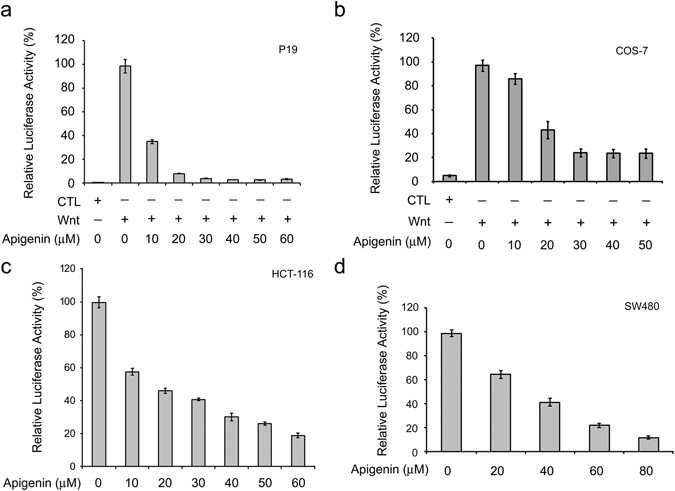Figure 1.

Apigenin inhibits Wnt signaling. (a) Apigenin inhibits Wnt signaling of Wnt-stimulated P19 cells. Cells were transfected with the Wnt reporter pGL3-OT and the normalization reporter pTK-Renilla (dual reporters) and treated with control-conditioned medium (CTL), Wnt-3a-conditioned medium (Wnt), or different concentrations (10~60 μM) of apigenin in Wnt-3a-conditioned medium for 16 h, and assayed for dual luciferase activities. (b) Apigenin inhibits Wnt signaling of Wnt-stimulated COS-7 cells. Reporter-transfected cells were treated with control-conditioned medium, Wnt-3a-conditioned medium, or different concentrations (10~50 μM) of apigenin in Wnt-3a-conditioned medium for 20 h, and assayed for dual luciferase activities. Each treatment is in three replicates and data were mean ± S.D. The dual luciferase activity of Wnt-stimulated cells was set as 100% and the relative activity of other treatment was calculated accordingly. (c) Apigenin inhibits intrinsic Wnt signaling in HCT-116 cells. Cells were transfected with dual reporters, treated with different concentrations (0~60 μM) of apigenin for 22 h, and then assayed for dual luciferase activities. (d) Apigenin inhibits intrinsic Wnt signaling in SW480 cells. Reporter-transfected cells were treated with different concentrations (0~80 μM) of apigenin for 22 h, and assayed for dual luciferase activities. Each treatment is in three replicates and data were mean ± S.D. The luciferase activity of treatment without any drug was set as 100%, and the relative activity of other treatment was calculated accordingly.
